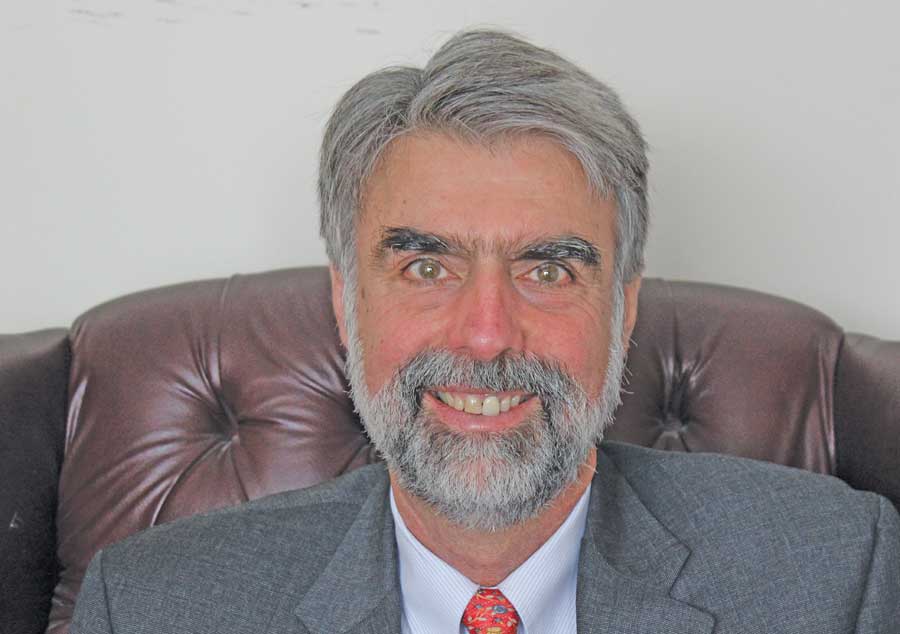VSC Board directs colleges to develop “strategic alliances”
Jeb Spaulding
On Jan. 20, the VSC published a press release announcing plans for “strategic alliances” among the Vermont State Colleges, including enhanced cooperation between Johnson State College and Lyndon State College.
Exactly how those alliances might take shape remains to be determined.
“What we’re looking for are ways that Johnson State College and Lyndon State College can work together to complement what they already do well, to provide the best possible student experience we can with the lowest cost that we can,” said VSC Chancellor Jeb Spaulding.
According to James Black, professor and chair of the business and economics department, his department is exploring joint programming with Lyndon for a number of courses, where appropriate, so that both colleges can reduce redundancies and improve enrollment in shared classes.
“The idea there is that if both of us are offering the same course at the same time… we may not have enough students for the course to run at Johnson or Lyndon, but together we do,” said Black.
According to Black, this would help eliminate the need to cancel courses due to low enrollment, and thus provide students with more academic opportunities.
The directive from the board calls for cooperation in many areas of campus operations. “We will look into the opportunity for joint resources,” said JSC President Elaine Collins. “So, for example, if a fundraising office subscribed to a particular resource, and then Lyndon was also paying for the same resource, would we get a better price if we combined those services and just had the one resource for both of our campuses?”
In a subsequent press release from the chancellor’s office, the board sought to clarify its intent in directing the colleges to explore strategic alliances, noting that “…the reality we all need to acknowledge, which is not meant to discourage but to encourage, is this: the Board and the Chancellor are looking square in the face of challenges that no one college — JSC, LSC, VT Tech, CCV OR CU, will endure alone: the undeniable plunge in the college-going population and continued disinvestment by the state.”
At the same time the board emphasized that it is committed to the continued vibrancy of the five colleges. The subsequent release noted that “M. Jerome Diamond, Chair of the Long Range Planning Committee, emphasized that his committee members envision maintaining the existing, vibrant campuses – each with its own identity and critical role in its regional economy – and separate accreditation.”
The board has emphasized that neither the closing of any VSC institution, nor a merger among them, is being considered.
Collins said that she would like to see more opportunities for students to access classes at another campus, and would like to see Johnson and Lyndon use a similar technology model that VTC and CCV use to offer classes so that students would not have to travel back and forth.
“From my understanding, right now I do not believe a class could be offered at, let’s say, Lyndon, and then be taken by a student at Johnson or vice versa. I don’t think we have the technology existing for that,” said Collins.
Black suggested Skype as a possible technology to allow students to participate in one of these joint classes.
“The point is to look for ways that we can actually have the two colleges work together to make sure that we’re spending our limited dollars as well as we can to enhance the student experience,” said Spaulding. “And I think that there are ways where we can provide our students with access to programs and professionals and opportunities across the two campuses. So that’s generally what we’re looking for; how we do it, it’s too early to say.”
According to Black, a faculty member at Lyndon and he have exchanged course lists. At a later point, both institutions will meet again and figure out how to make a joint schedule work.
Because no programs or resources have been identified to be combined, there is no estimation for how much money JSC would save in the long run. However, Collins stated that the primary reason for these alliances wouldn’t always be financial savings; efficiency and quality of service would also be a determining factor.
“This is not board-imposed,” said Collins. “In other words, the overall goal is a goal for the board, but how we get there is not prescribed by the board. So it will be up to us as a campus to figure out what makes sense for us… and to the extent that we all get involved in that discussion, then we can have an outcome that people feel better about.”
While both colleges will maintain separate accreditation from the New England Association of Schools and Colleges, the board seeks to avoid the duplication of programs between the two colleges.



